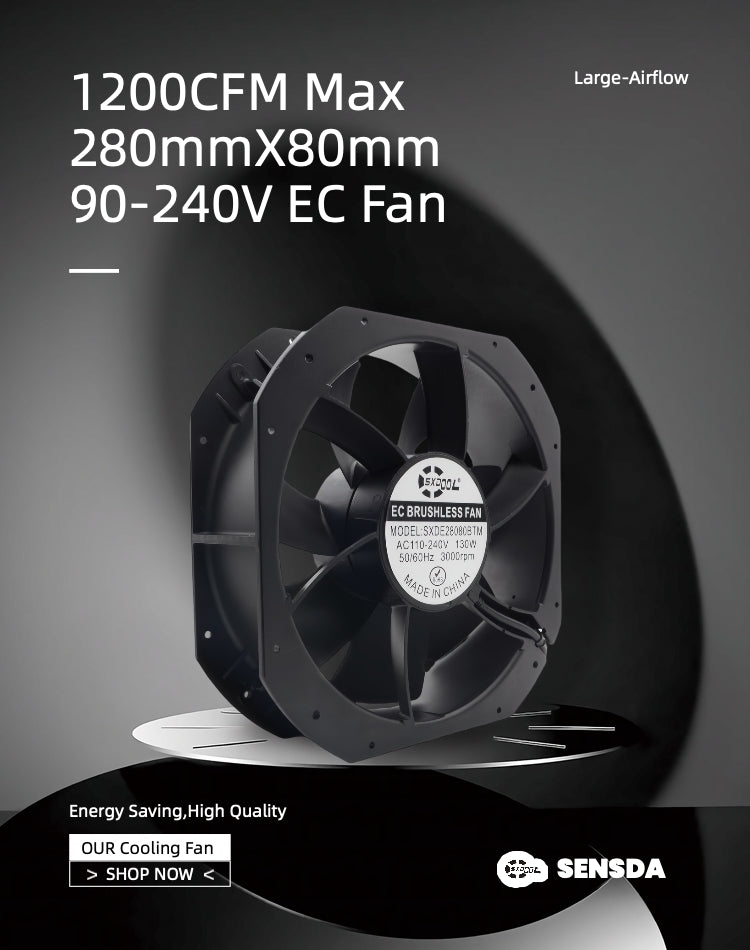
DC vs AC Fans: 10 Key Selection Scenarios for Cooling Fans
1. Server Rooms and Data Centers
- DC Fans: Often preferred due to their energy efficiency and lower power consumption. DC fans can be easily integrated into computer servers, offering precise control over fan speed, which helps optimize airflow and temperature management.
- AC Fans: Typically used in larger systems where energy efficiency isn't as critical. AC fans can handle larger volumes of air, making them ideal for industrial-scale cooling applications.
Recommendation: For energy-efficient, adjustable speed control, DC fans are the better choice.
2. HVAC Systems
- DC Fans: Ideal for HVAC systems that require constant speed adjustments. DC fans can be controlled more precisely, providing better comfort and energy savings in residential or commercial air conditioning systems.
- AC Fans: While AC fans are powerful and durable, they are less flexible when it comes to speed control. For simpler, non-variable speed systems, AC fans are a good option.
Recommendation: DC fans are superior for variable-speed control systems, but for basic on/off applications, AC fans work well.
3. Industrial Equipment Cooling
- DC Fans: Used in applications where lower energy consumption is a priority. DC fans can be used in smaller machines, offering long-term savings.
- AC Fans: Generally preferred in large-scale industrial equipment where high airflow is required. AC fans can operate at higher speeds without the need for additional power converters.
Recommendation: AC fans are better suited for large equipment due to their high airflow capabilities.
4. Personal Computers (PCs)
- DC Fans: The most common choice for PC cooling due to their energy efficiency and quiet operation. They also allow for fine-tuned fan speeds to balance cooling and noise levels.
- AC Fans: Less common for PC cooling due to the need for a power adapter, higher noise levels, and limited speed control options.
Recommendation: DC fans are the clear winner for personal computers due to their low noise and precise control.
5. Power Supplies
- DC Fans: Often used in power supply units (PSUs) for their ability to operate efficiently within the narrow voltage range typical of most power supplies.
- AC Fans: Can be used in high-power applications but may not provide the same level of efficiency as DC fans in power supply units.
Recommendation: DC fans are ideal for PSUs due to their compatibility and efficiency.
6. Electric Control Cabinets
- DC Fans: Highly effective for controlling temperatures in electrical control cabinets, especially where space is limited. They can be fine-tuned for efficiency and are often quieter.
- AC Fans: Typically used in larger enclosures, AC fans provide robust airflow but may be noisier and less adjustable.
Recommendation: DC fans are better suited for smaller, quieter cooling needs in control cabinets.
7. Automotive Applications
- DC Fans: Commonly found in automotive cooling systems, such as for radiators or air conditioning, because of their ability to operate directly from the car's battery.
- AC Fans: Less common in vehicles, as the need for AC power and an additional power converter makes them impractical for most automotive uses.
Recommendation: DC fans are the preferred option for automotive applications due to ease of integration with vehicle electrical systems.
8. Home Appliances (Refrigerators, Microwaves)
- DC Fans: DC fans are becoming increasingly common in home appliances, as they offer low energy consumption and quieter operation.
- AC Fans: Still used in many home appliances, AC fans provide reliability and high airflow in situations where noise isn’t a concern.
Recommendation: DC fans are becoming the go-to for energy-efficient and quiet cooling in home appliances.
9. Greenhouses and Agriculture
- DC Fans: Suitable for climate-controlled environments such as greenhouses, where low power consumption and adjustable airflow are essential for maintaining the ideal growing conditions.
- AC Fans: Ideal for larger-scale agricultural operations where the priority is powerful, continuous airflow without the need for speed control.
Recommendation: DC fans offer more flexibility in terms of energy use and airflow control in smaller, controlled environments.
10. Soldering and Smoke Removal
- DC Fans: Preferred for soldering stations and smoke removal systems due to their low noise levels and ability to provide targeted airflow without disrupting delicate work.
- AC Fans: Generally used in larger-scale exhaust systems where high-power ventilation is needed, but can be noisy and may lack fine speed adjustments.
Recommendation: For quiet, focused airflow, DC fans are ideal for soldering and smoke extraction.











